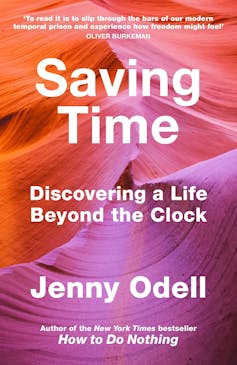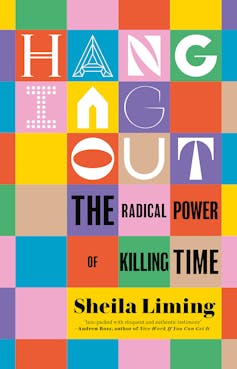
[ad_1]
When my daughter was within the early years of main college, her class was requested what their mother and father’ hobbies have been. My daughter piped up promptly with mine: “Studying, sleeping, and ingesting wine.” This disclosure of my deficiences — among the many extra well-adapted choices of biking, gardening, Pilates observe and marathon-running — bought me within the delicate nervous centre of my self-worth.
Sleeping, studying and ingesting wine are three issues I’ve all the time felt responsible about. They’re emblematic of my persistent tendency to procrastinate, my lax self-regulation, my failure to make use of time productively. Excluding my contribution to the wine business, they don’t have any greenback worth. They produce nothing of quick, measurable worth. They don’t have any rounded sense of job completion at their finish.
All of them require a free and idle relationship with time. Studying US essayist Sheila Liming’s Hanging Out: The novel energy of killing time, I realise that, in indulging my doubtful pastimes, I’m actually merely “hanging out” with myself.
And “hanging out” — that beneficiant, time-lazy, day-squandering exercise that appears to belong solely to childhood and adolescence — could be, Liming says, not solely a “survival mechanism” and deeply human want, however an act of refusal, an act with a “radical character”.
Saving Time: Discovering a life past the clock – Jenny Odell (The Bodley Head); Hanging Out: The novel energy of killing time – Sheila Liming (Black Inc.)
Studying Liming’s effortlessly clever e book, I start to extra deeply perceive the place my guilt comes from. It’s not simply coming from my liver. And I’m not sleeping ten hours a day simply to refresh myself for extra productive work. I don’t learn merely to develop into erudite and knowledgeable sufficient to pen articles like this.
I’m responsible as a result of hanging out — both alone or with mates — has develop into anxiety-ridden, overthought, over-structured, over-laden. Unfree. All these different issues I needs to be doing. And I can’t dismiss them, as a result of they’ve colonised my very being.

Annie Spratt/Unsplash, CC BY
Liming locates this colonisation — and by extension the guilt of the trendy Western world — partly within the Protestant work ethic and the policing of self that equated idleness with the satan’s work. Idleness — all the time considered suspiciously, particularly when you have been poor — turned more and more an ethical sin that required vigilant resistance.
It’s a phenomenon Barbara Ehrenreich additionally wrote about in her 2010 critique of the US positive-thinking business, Smile Or Die: How optimistic pondering fooled America and the world: a deep Calvinist contempt for the unimproved self that seeped into the bones and flesh of America, holding the person liable for their misfortunes within the face of brutal systemic and structural inequity.
This “pull your self up by your bootstraps” tradition (a phrase which, as Jenny Odell factors out in Saving Time: Discovering a Life Past the Clock, is in itself oxymoronic) has metastasised right into a full-body brutality pushed relentlessly on the self: multi-directional, time insistent, waste-not want-not.
The strapping and tethering of time to the ends of free-market productiveness guidelines out the situations required for stretching and rising. We’ve recognized this, in fact, since Marx’s Das Kapital (Capital) of 1867 – and we all know it in our our bodies every day, once we shed time like pores and skin, till we’re pink and uncooked on the finish of the day.
Right here is the place enjoyable – the place “hanging out” – turns into a robust act of resistance. Enjoyable is suspect as a result of it hovers and refuses to land; it nets nothing and feeds the second, not the underside line.
“Enjoyable threatens to contaminate and pervert the sanctity of labour,” writes Liming, “and likewise the ability of those that would have us do extra of it, at no cost, by cramming extra into the slim, pre-existing areas of paychecks and contracts.”
Lassitude and playfulness, she writes, are mandatory precursors to invention, creativeness, connective social thought and behavior. Typically a revelatory thought wants to come back out of nowhere and never out of the targeted coaching of the thoughts on an issue.
Commodified enjoyable, in fact, makes a revenue for somebody someplace, and depends on the customarily poorly paid labour of somebody someplace. However enjoyable that exists outdoors this house — whether or not it’s two our bodies coming collectively, or 20, or 100; in a park or on a seaside or in somebody’s pebble-mix again backyard — is usually a highly effective, soul-replenishing “No” to the warped logic of the world.
Learn extra:
Barbara Ehrenreich by no means stopped making an attempt to vary the world
Childhood time and jamming
Was the precise texture of life, of human interplay, totally different in childhood: when time swam and wandered after which ebbed with the solar and the decision to dinner?
Who’s to say that the time I expertise now — task-driven, minute-counting — is conceptually more true than that skilled by kids? “When is it Christmas once more?” I keep in mind asking my mom. She shook her head sadly: “Not for a lot of months. Not until nicely after your birthday.”
How was it attainable to attend via a lot time? I imagined it like mud or treacle — a stretch of sticky, recalcitrant expertise to be trudged via. I got here to the compelling conclusion there have to be a trick adults didn’t inform you about. That you just simply wakened in the future to search out you have been outdated.

Michael Morse/Pexels, CC BY
Songs come to thoughts. Pink Floyd, describing the way you meet up with the Solar, solely to search out it arising behind you once more. Ageing you each time.
Performs and literature come to thoughts: the purposeless ready of Ready for Godot, the real-time deterioration of Dorian Grey’s portrait, the backwards trajectory of Benjamin Button. Time ticks ineluctably down. Or is a factor we should fill – a container, with deeds and experiences and successes – whereas we will? Or a factor to be escaped: the oldest bogeyman within the e book.
Hanging out permits us to reconceptualise time. For me, Liming’s most potent instance of in a different way skilled time was her chapter on jamming as a type of hanging out.
A bunch of musicians comes collectively and, with belief and house, their creativities converge right into a time-swelling dialog. It’s a dialog that’s ephemeral, tenuous, delicate generally, strong generally. And it comes from a spot of attuned listening and connecting.
To improvise with different musicians entails the braveness to magnanimously court docket error. It doesn’t seize time a lot as totally inhabit it, in a dialogue in lots of elements and lots of voices. And due to its ephemerality, it eludes commodification. If the “document” button is rarely hit, it exists in uncommodifiable house and time.
Studying Liming on jamming and improvisation, I used to be reminded of the title story of E. Annie Proulx’s 1995 Heartsongs. On this story, we meet Snipe, a no-hoper conman, out for the subsequent exploitable alternative when he stumbles on the hokey mountaintop Twilight household.

Edward Eyer/Unsplash, CC BY
He can’t fairly work out the relationships between the relations, however on the finish of a meal he’s invited to, he’s welcomed into their household musical circle. Hardly a phrase is uttered on this unusual after-dinner ritual, however when the Twilights decide up their devices and start to play, Snipe turns into more and more excited: propelled by the rhythms and strands and subtleties they create.
He sees without delay that that is one thing lovely and beautiful, treasured and uncommon. Invaluable. However when he proposes to the Twilight household that he handle them, tour them — that there are unimaginable income to be made — they aren’t solely detached, however reject his proposition out of hand. Snipe slinks away, after numerous fruitless efforts to persuade: he has no body of reference for his or her refusal.
I saved coming again to Heartsongs whereas studying Hanging Out — actually, it’s the one story I recall in Proulx’s assortment. It’s a lesson in humility, I believe: cussed, moral humility that is still impervious to the advertising and marketing imperatives of the world. Improvisation, it tells us, is usually a way of life. Time doesn’t need to be was {dollars}.
‘Politically subversive’ sleep
My battle with extreme sleep, and the “waste of time” it represents has endured all through my complete grownup life. I’ve tried to curtail my sleeping, tried to sleep like others do (much less), tried to remain awake in entrance of a pc display screen when my eyes are rolling again in my head.
I’ve felt incessantly responsible about my want for sleep, and frightened after I learn articles that inform me an excessive amount of sleep will shorten my life. I’ve slept below desks in lecture rooms, on workplace flooring, on couches in libraries and seats in parks. I’ve slept at a dwell music venue whereas the band performed.
And I’ve slept at events. Many, many events. In my twenties, I threw massive dinner events the place I’d spend the entire day cooking and making ready, after which, at 9pm, when the meals was eaten, I’d go off to my bed room and sleep. Having infants gave me the proper excuse; I’d take them off to mattress, breastfeed them, and by no means resurface.
There have to be others like me, I believed. I briefly entertained the notion of instigating a Sleep Membership in Melbourne’s CBD, a spot the place folks like me may go to securely sleep in between different actions. However how to make sure Sleep Membership didn’t flip into Intercourse Membership? Tips on how to pay for sheets and blankets and mattresses (and CBD lease)? And how one can make Sleep Membership worthwhile? Right here was the very crux of the issue: how may I cost folks to sleep? And wouldn’t that contradict the entire goal of my thought?

Gregory Pappas/Unsplash, CC BY
In Saving Time, Jenny Odell tells us of activist and poet Tricia Hersey’s organisation Nap Ministry, established to handle “the sleep deprivation of enslaved peoples and their standing as commodifed our bodies”. Nap Ministry encourages collective napping experiences, in addition to performances and workshops geared to the reinstituting of sleep as a human proper.
Hersey claims sleep as a politically subversive motion (which helps me legitimise my very own sleeping habits). However in Hanging Out, Sheila Liming writes of sleeping in a method that reveals to me what maybe I used to be searching for in my very own soporific social withdrawals.
Sleeping at events, she writes, offers the “serenity of easy inclusion”. It’s security made even safer by the murmur of social pleasure: a sort of umbrella or arc of exuberant heat. This identical hum of heat and sociality and safety soothed me as a baby when my mother and father’ dinner events prolonged late into the evening.
On this method, the pleasure of “hanging out” will be skilled vicariously. Liming cites Audre Lorde’s poem The Electrical Slide Boogie, by which a dying girl listens to a celebration in full swing on the opposite aspect of her wall. There is no such thing as a “Rage, rage in opposition to the dying of the sunshine” in her musings, however a delicate, mild and finally beneficiant lament: “How arduous it’s to sleep/in the course of life.”
Learn extra:
Wellness is just not girls’s buddy. It’s a distraction from what actually ails us
Time and the extraction of labour
When did the productive use of time start to be a measurement of human value?
Earlier than the arrival of recent clock-time, Jenny Odell tells us, the “instruments of coordination” — in Western Christendom at the very least — have been bells, implementing the “temporal self-discipline” of Benedictine and Cistercian monks.
How mild and undemanding bells appear to us within the twenty first century; a languorous type of time-marking, which known as us to prayer and meals and sleep. Final 12 months I used to be lucky sufficient to spend per week within the tiny city of Sivignon in southern France: there I forgot about my watch all collectively, guided by half-hour chimes that didn’t even interrupt my sleep, although they continued unabated all through the evening.

In Saving Time, Odell locates the invention of fungible time — time that may be damaged down into smaller and smaller measurable, productive increments — within the spreadsheets of Southern plantation house owners.
Fashionable time, she suggests, took place as a product of slavery and its discount of human value to the extraction of labour. Studying this, it’s arduous to not conclude people are the inherent exploiters of different people by any know-how out there or inventable – together with the shared know-how of time. A few of us have possessed time, and, within the course of, dispossessed others of it.
Centuries years later, we dwell in a world the place time is much more minutely monitored. Employees won’t clock out and in on the job anymore (old style punch playing cards at the very least marked a starting and an finish to a day’s work), however their time is as successfully surveilled by keystroke monitoring, key efficiency indicators, and steady enchancment cycles – winnowing lives into smaller and smaller particles of knowledge. Work bleeds into leisure and leisure bleeds into work; clear boundaries not exist.
Leisure itself has develop into merely one other alternative for self-optimisation (the above-mentioned marathons and Pilates). Slowness — initially a refutation of the obsessive equating of busyness with ethical good — has been was its personal type of consumption, and a type of consumption quarantined for the well-off. Sluggish-cooking, slow-living, “self-care” can’t be indulged by these frantically making an attempt to make ends meet with a sequence of informal jobs in a gig economic system. Time, writes Odell, has develop into “the punitive dimension”.
The “science of time”, most notably formalised in Frederick Winslow Taylor’s 1911 The Rules of Scientific Administration, has given us a linear, task-oriented method of creating sense of ourselves. Drawing on the work of German thinker Josef Pieper, Odell argues leisure needs to be “vertical” not “horizontal”: “[T]rue leisure requires the sort of vacancy by which you keep in mind the actual fact of your personal aliveness.”
Many people skilled this vacancy throughout Covid; we turned “estranged from widespread types of marking time” and thus extra alive to time’s pure rhythms. We took lengthy walks and seen new buds on timber, watched fledgling falcons rouse from nests on the roofs of skyscrapers, heard the birdsong that had all the time existed behind the incessant business and site visitors of every day life.
On reflection, COVID lockdown might sound merely a interval of hiatus, from which the world has decisively returned. However there may be political potential within the expertise and the best way it launched us – briefly anyway – from our regular temporal subjugations.
Odell cites Nineteenth-century labour chief Ira Steward to make additional sense of this expertise. He described the expertise of leisure as a “clean — a unfavourable — a chunk of white paper”, not one thing to be stuffed or pre-inscribed. Steward’s “clean”, writes Odell, “was much less like foam padding protecting a hierarchy in place than like a gasoline whose each improve carried the potential of extra cracks within the system.”
In a world of temporal urgencies — of company and political greed; local weather disaster; financial, race and gender inequality — we want these cracks. And we want the gasoline that creates them.
Learn extra:
As boundaries between work and residential vanish, staff want a ‘proper to disconnect’
Ladies’s time ‘didn’t economically exist’
Central to any dialogue of time is the best way girls have skilled the financial devaluation of their time. Arlie Russell Hochschild wrote in 1989 of the best way feminism in impact created a “second shift” for girls.
I’ve usually considered this as feminism’s present to males, releasing them from the unilateral burden of bringing in a wage, however with out repositioning them to take up their share of child-rearing and house responsibilities: on this courageous new world, girls merely did each types of labour, paid and unpaid.
“The place girls are involved,” wrote Mariarosa Dalla Costa and Selma James, proponents of the Seventies Wages for Home tasks motion, “their labour seems to be a private service outdoors of capital.”
Odell tells of the primary New Zealand member of parliament Marilyn Sporting, who studied the provisioning for girls’s time and unpaid labour in present financial buildings for her 1988 e book If Ladies Counted: A New Feminist Economics. She discovered, fairly merely, that girls’s time, and girls’s work, didn’t economically exist.

Brina Blum/Unsplash, CC BY
And if girls’s work time doesn’t exist, what of girls’s leisure time? In 1929, in A Room of One’s Personal, Virginia Woolf requested:
[W]hat alternations of labor and relaxation [might women] want, deciphering relaxation as not doing nothing however as doing one thing however one thing that’s totally different; and what ought to that distinction be? All this needs to be mentioned and found.
As with so a lot of Virginia Woolf’s questions, the solutions stay at massive.
Have been girls previously extra wretchedly utilized by time? Or are the makes use of simply totally different now: the burdens outsourced, displaced onto others so new burdens may be absorbed? I’ve usually questioned, how — after they hardly had sizzling water and ran their garments via a mangle after sloshing them in sudsy water with a paddle — girls of the previous managed so decisively to outdo us when it got here to protecting the world clear?
I haven’t run an iron over an article of clothes in years. Boiling issues, steaming issues, soaking issues, making vinegar and bicarb options, utilizing lemon juice in exceptional methods to get out stains. Arduous-bristled ground brushes on flagged flooring, adopted by mopping (with boiled water). How did they get all of the grit out of the tiles and the baked on charcoal out of ovens? Did they use their time higher than us?
In a sure a part of Malaysia, Odell tells us, a girl’s measurement of time prevails; to the query “how lengthy does it take to get there?” the reply may be “three-rice-cookings”. I like this remoulding of time within the form of girls’s conventional chores. How lengthy does it take to get there? “4 nappy adjustments.” “Six a great deal of washing.” “13 bedtime tales.”
Redefining time
Odell leads us from our small, slender, self-flagellating expertise of time to its deeper manifestations and inhabitations. She begins with moss: invisibly shifting, formidably rising, in a method that’s harking back to Sylvia Plath’s poem Mushrooms. Within the creeping pathway of moss that grows in a cactus planter on her windowsill, Odell observes continuity at work, the feeding of time with extra time: “Tomorrow was rising uncooked out of the husk of at present.”
Crops, Odell writes, are “the continued materialisation of time itself”. And in rocks and stone and pebbles we bear witness to a geological time that’s previous, current and future unexpectedly. We can’t suppress time or nature, or the character–time confluence of occasions comparable to landslides. The subjecthood and company of the non-human, of the apparently inert, educate us one thing that clocks can’t.

Annie Spratt/Unsplash, CC BY
As do Indigenous notions of time. Invoice Gammage’s 2012 e book The Largest Property on Earth was revelatory upon publication not due to its rigorously organised proof of Indigenous plant cultivation, however due to the Indigenous conceptualisation of time the e book conveyed.
Indigenous time was too huge to make fungible: it was understood throughout big expanses of land, imagined nicely past the lifetime of the person, connective of previous, current and future. It was a conceptualisation of time so overseas to colonisers, the architects of fungible time, that it was ungraspable, solely demeanable.
In measuring time so finely, in reducing it down and down into microscopic types of accountability, we’ve demeaned time. Now we have made it unhappy and attenuated. We deny it its energy and sanctity.
Fashionable time feels ‘toxic’
Unusually, whereas studying Odell’s and Liming’s books, and fascinated about this text, my wristwatch stopped working. It has remained on my arm regardless, caught at an everlasting 11:10, and I preserve referring to it out of behavior. I want this have been a supply of calm for me, that it made me cease and suppose in methods aside from minutes and hours. However it doesn’t. It makes me sick comfortable, and jogs my memory of yet one more factor to placed on my to-do record (get battery).

Pa
I can’t discover the “temporal latitude” to disengage myself from the anxieties of a stopped watch, as a result of I don’t dwell on a mountain or in a cave. I’ve a mortgage to pay and youngsters to shepherd correctly into maturity. I don’t have the time to be free, or large, about time. And that is the crux of so a lot of our present issues and neuroses. We all know it. We all know how trendy time feels in our our bodies — like quicksilver, toxic, inconceivable to pin down.
Each Odell and Liming suggest “time activism” as half of a bigger undertaking to handle the pressing points our world faces. We want a “strategic confiscation of time,” Liming says: we have to kill time good and useless and let it resurface in its personal pure, communal rhythms – knowledgeable by our wants and never our labour worth.
However maybe we additionally have to deal with it extra gently, to have a tendency it with care and understanding. “Wouldn’t it be attainable,” writes Odell, “to not save and spend time, however to backyard it – by saving, inventing, and stewarding totally different rhythms of life?”
[ad_2]
